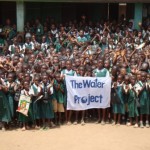This project was implemented by another partner, but is now monitored and maintained by The Water Project together with Mariatu's Hope.
It was wonderful to be able to do such a project at this school. We have already done three projects in this community at the St. Augustine's Jr. and Sr. Agricultural Secondary School. Now, students who live in this community begin their school career at Mother Teresa's Pre-Primary School, then go to St. Augustines Primary and then on to the Jr/Sr. Secondary Schools being able to enjoy clean water and sanitation. This will hopefully be life changing for these students and will hopefully also mean change for the better for this country. The teachers and parents of Mother Teresa's and St. Augustine Primary Schools were so cooperative and are really excited about the project. It will be exciting to see what happens in this community years from now. When the team arrived, community members and students were using a well unable to meet their water needs, and because of this, residents and students were suffering from dysentery, typhoid and malaria. During the team’s stay, community members assisted the team with the water project whenever possible, provided any materials they had available, made food for the team and provided security over the water project and housing. Most community members earn a living by teaching, working as professionals, farming, petty trading, palm wine tapping, weaving and a few work as tailors. Before leaving the community, Mrs. Cassandra Johnson, was designated to be the local well contact.
The Sierra Leone team had an opportunity to meet with twelve year old community member and student class 6, Fancynatu K. Fancynatu is the head girl at St. Augustine. She has a bright future. "I am so excited and thankful to have toilets like this at my school. It really shows your commitment to the students in this community and country. Going kaka in the bush is not healthy for anyone and I wish to extend my thanks and gratitude to The Water Project and Living Water International. May the Almighty bless you."
The hygiene training was done over a period of two full days. We included the teachers from Mother Teresa's Pre- Primary School for the training because those students will attend this primary school and it's never too soon to begin teaching the students the value of good hygiene. We use an SSHE/SLTS approach to our WaSH projects. We come in and teach the teachers the lessons. They teach the lessons to the students and then the students teach their communities what they have learned in regards to good hygiene and using a toilet. We also used the students in this community to help with the hygiene training at the community well. Each teacher got a folder with the hygiene lessons and several manuals with laminated pictures were left at the school. One manual was given to the Pre-Primary School so the teachers could use this in their curriculum. During the hygiene education, the following issues were addressed: Disease transmission, germs, hand washing, proper water saving techniques, healthy and unhealthy communities, Oral Rehydration Solution, how to take proper care of the pump, how to keep the water clean, tippy tap – a simple hand washing devise, good and bad hygiene behaviors, clean hands and clean hearts, disease transmission stories and dental hygiene.
 WAsH for Schools
WAsH for Schools Rehabilitation Project
Rehabilitation Project












